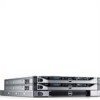Dell PowerVault NX3500 Administrator's Guide - Page 149
Unicode Configuration Limitations, File Size and Directory Name, Clients Compatibility Problems
 |
View all Dell PowerVault NX3500 manuals
Add to My Manuals
Save this manual to your list of manuals |
Page 149 highlights
Unicode Configuration Limitations Following are the Unicode configuration limitations: • File Size and Directory Name • Clients Compatibility Problems • Japanese Compatibility Issues File Size and Directory Name The size of the file and the directory names are limited to 255 bytes, which may be less than 255 characters when using Unicode, because each UTF-8 character occupies between 1 to 6 bytes. Clients Compatibility Problems In some cases different vendors use different UTF-8 encoding for the same code page entries. The result will either be that these characters will not be displayed, or that these will be substituted by other characters similar in shape. Japanese Compatibility Issues Administrators using the CLI will be able to enter Japanese characters in configuration parameters only through the web interface, because XTERM applications such as KTERM does not enable you to use UTF-8 characters. The following table details the Japanese incompatible characters. Table 11-2. Japanese Incompatible Characters Character UNIX Windows Macintosh WAVE DASH (~) U+301C (WAVE U+FF5E DASH) (FULLWIDTH TILDE) U+301C (WAVE DASH) DOUBLE VERTICAL LINE (||) U+2016 U+2225 (DOUBLE (PARALLEL TO) VERTICAL LINE) U+2016 (DOUBLE VERTICAL LINE) MINUS SIGN (-) U+2212 (MINUS U+FF0D U+2212 (MINUS SIGN) (FULLWIDTH SIGN) HYPHEN MINUS) Internationalization 149















